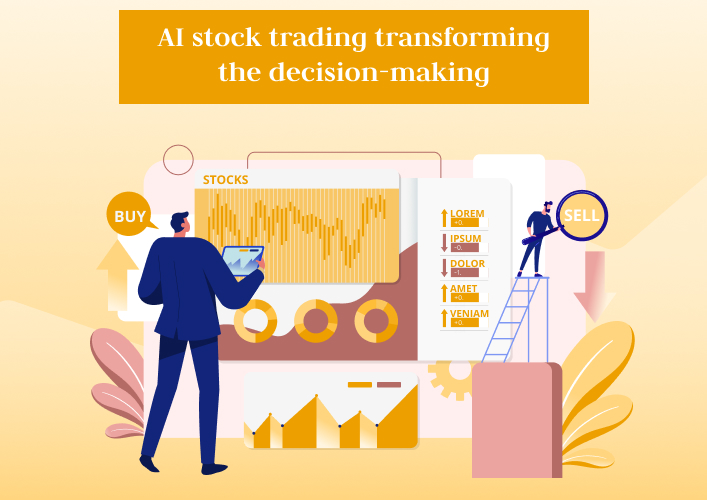AI stock trading transforming the decision-making

By continually evaluating stock prices and processing huge volumes of unstructured data, financial institutions may get significant insights into complicated trading possibilities that enable real-time buy and sell decisions.
Working of AI in stock trading
Artificial intelligence in stock trading accomplishes the goals by following the process mentioned below:
- Using AI in trade stock systems, it is possible to rapidly combine a wide variety of financial-related data sets, like news articles, social media trends, etc.
- Preprocessing the data means ensuring it’s error-free and well-structured, with any missing values filled in, so that it may be used effectively in conjunction with other elements.
- In order to generate reliable indications that have caused stock price fluctuations over time, it makes use of complex algorithms.
- Predictions of future trends may be obtained by training machine learning algorithms on previously acquired historical data. This allows the algorithms to recognize links and patterns between extracted data and stock price movements.
- Predictions are made by trained AI models evaluating real-time or historical data. They give insights on holding, selling, or purchasing a particular stock. They are based on market trends, risk tolerance, and the investor’s objectives.
- Putting suggestions from trained AI models into action is as simple as connecting them to brokerage platforms or hiring human traders who are familiar with the market and can offer their own advice. Constant monitoring helps in accurate performance.
Benefits of AI in stock trading
- Stock Brokers may save time and effort while conveniently monitoring their transactions. They can offer expert recommendations for their customers if they use AI-powered algorithms to automate their research processes and utilize data-driven tactics in their trade executions.
- AI stock trading systems analyze and examine news channels and social media platforms to identify unusual market swings and changes.
- Many large, established investing firms employ dozens of people across roles including broker, analyst, and adviser. Thus, organizations and investors can greatly cut overhead costs by adopting this system over time.
- Besides saving money in the long run, one advantage of using AI algorithms is that they are designed to operate reliably and without interruption, keeping an eye on the stock market around the clock.
- By removing the influence of illogical human emotions that can cloud judgment and result in bad investment decisions, AI trading gives market players a distinct advantage.
- Profits may be increased to their full potential since decisions are made quickly. At the same time, time is saved as there’s no demand for a supervisor to oversee the changing market circumstances throughout the day consistently.
Drawbacks of AI-powered stock trading
- Training data is essential for AI algorithms. If the data is biased or missing, it can cause trade choices that are biased.
- Concerns about ethics and the law may be raised by the actions of AI trading algorithms. Market manipulation and front-running are two potential outcomes of AI-powered high-frequency trading.
- Losses or lost chances can occur due to technological failures in AI-powered trading systems due to software bugs, hardware malfunctions, or interruptions in data feeds.
- Costs connected with data collecting, infrastructure, and the employment of AI specialists may add up quickly, making it difficult to justify the investment required to build, manage, and operate an AI trading system.
- Threats to data and proprietary algorithms or trading manipulation due to cyberattacks or unauthorized access, AI-powered trading systems may be vulnerable.
Thus, combining AI trading with human oversight, strong risk management, and constant monitoring can help reduce these downsides. Furthermore, authorities are focusing on establishing regulations and norms for trading using AI to guarantee equity and market stability.
Conclusion
AI stock trading is at the forefront of market transformation. It leverages advanced algorithms and machine learning models to analyze vast amounts of data, make rapid decisions, and execute trades. This technology has the potential to revolutionize the financial industry, offering benefits like increased efficiency, improved data analysis, and reduced human errors.
However, it also introduces new challenges, such as regulatory concerns, the risk of technical failures, and the potential for job displacement. As AI continues to evolve, it’s essential for the financial sector to have a balance between automation and human oversight, as well as to address the ethical and regulatory aspects of AI-powered trading to ensure fairness and market stability.
FAQs
What is AI stock trading?
What are the benefits of AI in stock trading?
What are the drawbacks of AI in stock trading?
How can AI be used in stock trading?
What is the role of human oversight in AI-powered trading?
Ravi Bhojani is the Chief Marketing Officer (CMO) at Alian Software, where he spearheads the company’s marketing strategies and drives its brand presence in the competitive IT services landscape. With over a decade of experience in the technology and marketing sectors, Ravi has consistently demonstrated his ability to blend innovative marketing techniques with deep industry knowledge to deliver outstanding results.